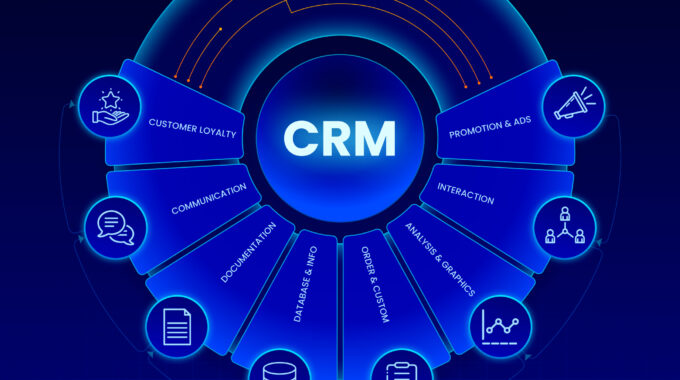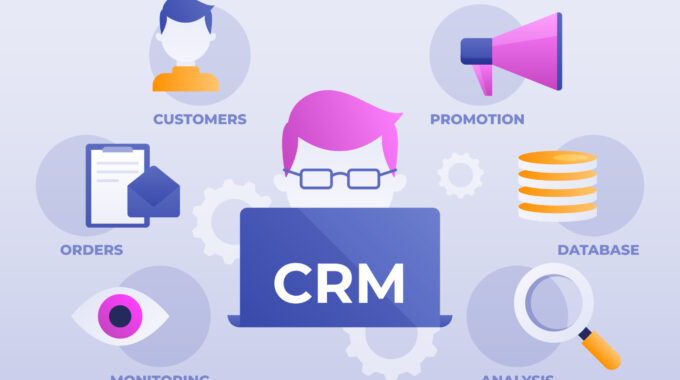Introduction Customer Relationship Management (CRM) serves as an effective growth booster, particularly for small and…

Customer Relationship Management (CRM) for B2B
Introduction
Customer relationship management (CRM) is a business strategy for improving customer relationships across an organization, from sales and marketing to customer service. CRM uses technology to provide a unified view of customer data and help businesses better serve their customers. Effective use of CRM can lead to better customer experiences and higher business growth.
When it comes to CRM, B2B companies have unique challenges and needs, since the complexities of their customer relationships and sales cycles are different from those of a B2C company. This article will address the unique Customer relationship management (CRM) considerations of B2B companies and provide best practices for successful implementation.
Types of CRM
There are several types of CRM, each catering to different needs.
Operational CRM focuses on streamlining business processes to improve efficiency and sales effectiveness. It does this by automating routine processes like updating customer data and gathering feedback.
Analytical CRM uses customer data to better inform strategies and to understand customer behavior. It can be used to build predictive models and uncover opportunities for growth.
Collaborative CRM increases visibility across the organization and enables teams to work together more efficiently.
Benefits of CRM
CRM has several key benefits for B2B companies.
Increases visibility: By providing a unified view of customer data, CRM provides greater visibility into customer activities and relationships. This helps sales and marketing teams collaborate more effectively and understand customer needs.
Improves customer service: By automating mundane customer service tasks, CRM allows customer service representatives to focus on more meaningful interactions with customers. This leads to improved customer satisfaction.
Enhances customer intelligence: By analyzing customer data, CRM can provide insights into customer buying patterns, preferences, and behavior. This can be used to improve customer experiences and inform business decisions.
Implementing a CRM Solution
In order for B2B companies to get the most out of their CRM solution, they must ensure its successful implementation. Here are a few considerations:
Data integration: A CRM system must be able to integrate with existing systems and databases. It should also be able to handle a variety of data sources, such as text, audio, video, and images. This will ensure that data is accurately collected and managed. Analytics: The CRM system should have powerful analytics capabilities that allow for data-driven decision making. This will enable teams to gain better insights into customer activities and trends.
Automation: To maximize efficiency, the CRM system should have automation capabilities, such as customer segmentation or automated customer service. This will free up valuable time and resources.
Customer intelligence: The CRM system should have tools to capture customer feedback and provide insights on customer sentiment. This will help teams better understand customer needs.
Features of a Modern CRM
Modern CRM systems should have a number of critical features to offer businesses with the tools they need to manage client relationships and enhance sales.
Data integration: As mentioned earlier, the CRM system should be able to integrate with existing systems and databases. This will ensure that customer data is accurately captured and analyzed.
Analytics: The CRM system should have powerful analytics tools to help teams uncover customer behavior trends and manage customer relationships more effectively.
Automation: To maximize efficiency, the CRM system should have automation capabilities, such as customer segmentation or automated customer service. This will enable businesses to respond quickly to customer needs.
Customer intelligence: The CRM system should have tools to capture customer feedback and provide insights on customer sentiment. This will help teams better understand customer needs.
The Future of CRM in B2B
As technology progresses, the capabilities of a modern CRM system should continue to evolve. Here are a few potential opportunities in the future:
Augmented Reality: Augmented reality (AR) can make it easier to visualize customer data and give customers a more immersive experience.
Chatbots: Chatbots powered by artificial intelligence can provide 24/7 customer service and automate mundane tasks.
Internet of Things: The Internet of Things can enable customers to track their orders in real time and provide businesses with data to inform decisions.
Best Practices for Adopting CRM
In order to get the most out of their CRM system, B2B companies should use the following best practices:
Develop a strategy: Develop a CRM strategy that articulates the business goals and objectives for using CRM. This will help to ensure that the implementation is purposeful and aligned with business objectives.
Gather stakeholder input: Gather input from stakeholders in the organization to ensure that the right systems and features are implemented. This will help to ensure an effective CRM implementation.
Focus on customer experience: Keep customer experiences top of mind when implementing CRM. This will ensure that customer data is used to improve customer experiences rather than just to increase sales.
Conclusion
Customer Relationship Management (CRM) is an important business strategy for B2B companies, as it enables them to better understand their customers and increase sales. This paper discussed the different types of CRM, the benefits, and considerations for successful implementation. It also outlined key features of a modern CRM system and explored the future of CRM in B2B. Lastly, it offered best practices for successful adoption and implementation of CRM. With the right strategy and tools, B2B companies can maximize the value of their CRM system and better serve their customers.
About Apoorva:
Apoorva is a technology services company that assists software products with ideation, developing prototypes, programming, creating a digital marketing presence and accelerating sales through direct contact. Over 150 for-profit and non-profit organizations, such as Xcel Energy, PeopleCare Health Services, Frontier Airlines and Centers for Spiritual Living have trusted Apoorva to build software.
Apoorva was founded in 2001, has more than 50 employees, and uses proprietary and proven methodologies to bring technology products to the market. Contact us / Visit apoorva.com for more information.




